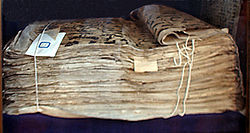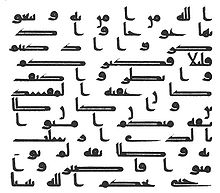- Uthman Quran
-
 The Samarkand manuscript, now kept in Tashkent.
The Samarkand manuscript, now kept in Tashkent.
The Othman Qur'an (also termed the Othmanic codex, Othmanic recension, Samarkand codex, Samarkand manuscript and Tashkent Qur'an), named for the third Caliph, Uthman ibn Affan, is a manuscript Qur'an kept in the Hast Imam library. Along with the Sana'a manuscripts, it is considered to be the oldest in the world.[1]
Contents
History
This copy of the Qur'an is attributed to the third caliph Uthman. In 651, 19 years after the death of Muhammad, Uthman commissioned a committee to produce a standard copy of the text of Quran (see Origin and development of the Qur'an).[1] Five of these original Qur'ans were sent to the major Muslim cities of the era, with Uthman keeping one for his own use in Medina. The only other surviving copy is said to be held in Topkapı Palace, in Turkey.[1][1]
Uthman was succeeded by Ali, who took the Uthman Qur'an to Kufa, now in Iraq. When Tamerlane destroyed the area, he took the Qur'an to his capital, Samarkand, as a treasure. It remained there for four centuries until, in 1868, when the Russians invaded, captured the Qur'an and brought it back to the Imperial Library in St. Petersburg (now known as the Russian National Library).[1]
After the October Revolution, Vladimir Lenin, in an act of good will to the Muslims of Russia gave the Qur'an to the people of Ufa, Bashkortostan. After repeated appeals by the people of Turkestan ASSR, the Qur'an was returned to Central Asia, to Tashkent, in 1924, where it has since remained.[1]
Current state
The parchment manuscript now is held in the library of the Telyashayakh Mosque, in the old "Hast-Imam" (Khazrati Imom) area of Tashkent, Uzbekistan, close to the grave of Kaffal Shashi, a tenth-century Islamic scholar.
The manuscript is incomplete, only a third of the Qur'an surviving:[1] it begins in the middle of verse 7 of the second sura and ends abruptly at Surah 43:10. The manuscript has between eight and twelve lines to the page and, showing its antiquity, the text is devoid of vocalisation.
Part of a series on
Sunni Islam
- Modesty
- Uthman Quran
- Khadijah's Daughters
See also
References
- ^ a b c d e f Ian MacWilliam (2006-01-05). "Tashkent's hidden Islamic relic". BBC News. http://news.bbc.co.uk/2/hi/asia-pacific/4581684.stm. Retrieved 2010-05-27.
External links
- (Tashkent's hidden Islamic relic)
- (Cities and Sites Visited by Secretary Albright)
- (Memory of the World Register - Nomination Form - Holy Koran Mushaf of Othman) - From UNESCO
- Picture of Uthman's Qur'an in situ Blog on British Library website
- Al-Mushaf Al-Imaam - Complete Manuscript in Electronic Forms at Internet Archive
Categories:- Quranic manuscripts
- Tashkent
- Memory of the World Register
Wikimedia Foundation. 2010.

